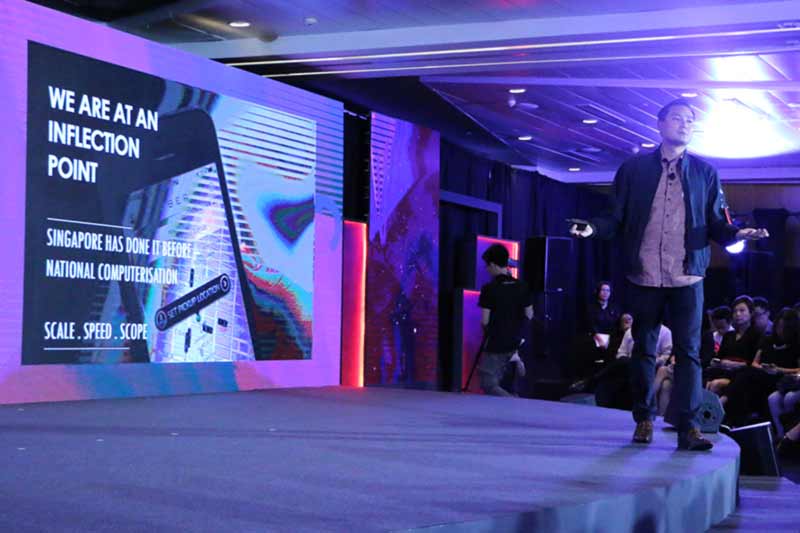
Above image: IMDA Chief Executive, Mr. Tan Kiat How at the launch of the ICM ITM
As part of the Infocomm Media Industry Transformation Map (ICM ITM) released today by the Infocomm Media Development Authority (IMDA), a series of initiatives were announced to develop the artificial intelligence (AI) ecosystem in Singapore. AI has been identified as one of four frontier technologies essential to growing Singapore’s economy, alongside Cybersecurity, Immersive Media and the Internet of Things.
AI Singapore (AI.SG) was set up in May 2017 with up to S$150 million fund to catalyse, synergise and boost Singapore’s AI capabilities.
Through these further measures, IMDA aims to drive industry adoption and understanding of the benefits from implementing AI; build a vibrant core of AI developers and companies; address specific AI leadership areas to grow industry capabilities; and continue to provide clarity and review relevant regulations which would enable AI solutions.
Drive industry adoption and understanding
IMDA hopes to make AI adopted as pervasively and ubiquitously as smartphones. IMDA hopes to do this by improving businesses’ understanding of the value that AI solutions can have on their enterprise, introducing suitable solutions for their needs; and supporting collaborations to showcase demonstrative projects in key sectors.
User companies who are looking to adopt AI solutions will be able to receive support in two ways.
Firstly, to catalyse adoption, IMDA is launching an AI Business Partnership Programme (AIBPP). The programme will seek to help companies solve business challenges through matching AI solutions, and supporting their adoption or prototyping.
Where relevant, IMDA will work with ministries and agencies to address problem statements which could be solved through the innovative use of AI. For example, in the finance industry, machine learning processes can be utilised to improve monitoring and anti-fraud systems as well as to integrate various datasets to generate predictive models for the insurance sector.
IMDA encourages user companies to work with AI solution providers on proofs-of-concept to integrate AI solutions into their company/product. Under the AIBPP, IMDA will consider defraying adoption risks by co-funding up to 50% of supported qualifying costs for suitable projects, to a maximum of S$100K/project. IMDA is also open to supporting large-scale industry-leading projects with the potential to disrupt sectors through the integration of AI on a case-by-case basis.
Guided by problem statements supplied by companies, IMDA will facilitate pitching sessions between interested AI solutions providers and companies. As part of this process, AI solutions providers might also work with the companies to further scope problem statements, provide mentorship, customize and finally deploy AI solutions to achieve business outcomes. Companies with problem statements which have no currently-available commercial solution will be channelled to AI Singapore’s 100 Experiments track.
As part of the programme, IMDA will also conduct workshops for businesses, to share potential applications of AI that can bring value to their business, and to introduce or co-develop suitable solutions for their needs. AI solutions which can serve the needs of broad swathes of companies – for example, in accounting or human resources – are of particular interest.
IMDA has already conducted the first such workshop in September for the retail and advertising sector, which saw a promising crowd of 12 retail and advertising companies attending. IMDA plans to conduct one workshop every quarter. The next workshop is currently planned for December and will be for the professional services sector.
Secondly, IMDA will leverage the SMEs Go Digital programme to reach out to a wide number of companies to broaden their exposure to AI.
SMEs Go Digital will further augment its Digital Tech Hub toadvise and assist SMEs to fully take advantage of business opportunities that AI can help them achieve. The DTH will work closely with SME Centres, Trade Associations and Chambers to conduct workshops to raise SMEs’ awareness and adoption of AI. Two Memoranda of Intent between IMDA and IBM and Microsoft, will give the DTH access to AI technologies from both companies to support SMEs on their digitalisation journey.
To make AI solutions readily available for enterprises to adopt quickly, Accreditation@SG Digital (rebranded from Accreditation@IMDA) will focus on AI as part of the identified four key frontier technologies. For a start, five new AI companies have been accredited, taking the total number of accredited AI companies to eight.
Build a vibrant core of AI developers and companies
It is also necessary to produce a pipeline of locally-based, globally-known, trained AI-enabled professionals to support the growth in demand. To ensure enterprises have the talent to implement AI, IMDA will work to narrow the gap in the talent pipeline and deepen skills in the existing ICM workforce. The pool will come from a mix of roles such as AI Scientists, AI Researchers, AI Engineers, AI Business Analysts and more.
These could be achieved through various efforts such as: Academic courses; research & development; and TechSkills Accelerator (TeSA) initiatives (which include short courses for skills upgrading, immersion programmes and company-led training programmes).
As a start IMDA will help to train part of this pool through an AI Singapore Apprenticeship Programme (AIAP) supported through TeSA company-led training programmes. AIAP is the first TeSA-Led Training (TeSA-CLT) initiative in AI. This is a collaboration between IMDA and AI Singapore.
The aim is to train up to 200 AI professionals in this field in batches over the next three years.
It will be accelerated to train more AI apprentices should demand by industry be strong. Through this full-time, nine-month structured CLT, fresh professionals will obtain skills training through AI courses conducted by AI Singapore and affiliated education organisations. The trainees will gain on-the-job training experience through industry projects and attachment opportunities.
At the end of the training, AI Professionals will be equipped with skills in machine and deep learning programming & development; the ability to deploy AI as a data product and/or service; and have hands-on experience in industry AI projects, mentored by experienced AI professionals.
Address specific AI leadership areas and build tech creators
IMDA plans to strengthen support for AI companies and grow the AI ecosystem in two ways. Firstly, to enable AI creators, IMDA will build capabilities in specific leadership areas such as a suite of AI libraries to enable innovation of AI-related applications. For example, a National Speech Corpus (NSC) is necessary to support and enhance the accuracy of speech recognition engines in the Republic, in addition to enabling global AI creators to provide speech related solutions for use here.
A corpus is a library of audio and text files, and is one of the key building blocks which AI technologies such as Automatic Speech Recognition (ASR) need to function. ASR solutions, such as voice assistants, train themselves with corpora to decipher spoken words and transcribe it into text. Multiple corpora with extensive data therefore increase the precision of transcriptions, resulting in more accurate responses.
Obtaining such corpora has been traditionally difficult for industries, as access to different sectors’ data to expand a corpus can be challenging.
IMDA can help here building a locally-accented and contextualised NSC in English. Technology providers, institutes of higher learning (IHLs) and research institutes will be able to leverage on the NSC to create innovative speech-enabled applications for various industry sectors.
As an example of an application, a Singaporean speaks into their phone rather than typing. The audio is captured by an ASR solution, which is used by a chatbot application. (“Where can I find store X?”). The ASR solution, which was trained and modelled from the NSC to adapt to accents in Singapore, transcribes the audio into text. The text is now machine-readable, or understandable by computers. The chatbot application can then formulate a response. (Keywords: Where, Find, Store, X). The response is given to the user.
The second means is to help build confidence in local AI companies via the newly enhanced Accreditation@SG Digital programme, rebranded from Accreditation@IMDA. To date, eight AI companies have been accredited, five of them today. They tackle challenges such as online fraud prevention and regulatory compliance.
Continue to provide clarity and review relevant regulations
Finally, Singapore will continue to build upon its regulatory base in data policy with forward-thinking and relevant AI & data governance guidelines for regulatory certainty, seeking to reinforce the country’s status as a leading destination for companies seeking to site, adopt, utilise and establish AI.
To further encourage market adoption and development of AI, the Personal Data Protection Commission (PDPC) will continue to maintain a ‘light-touch’ regulatory approach through existing baseline data protection laws.
However, the PDPC is cognizant that the methods by which data is generated and used today is vastly different from a decade ago, and Singapore must continue to stay ahead through responsible use of data (such as for the purposes of AI) and understanding the legal, policy and governance issues arising from AI & data. With that in view, the PDPC released a Guide to Data Sharing in July 2017.
The Guide outlines approaches for data sharing in compliance with the PDPA. It also articulates a data sharing arrangement framework within a regulatory sandbox which exempts enterprises from certain obligations to trial and support innovative uses of personal data.
IMDA is also exploring further research collaborations with IHLs to advance scholarship and discourse in legal, policy and governance issues arising from the use of AI and data. This would aid in contextualising the developments in AI and data use, and the impact and implications of such developments in decision-making.
















